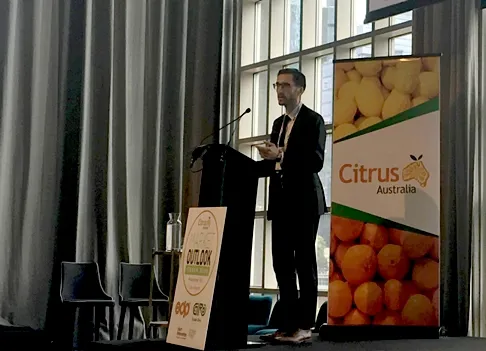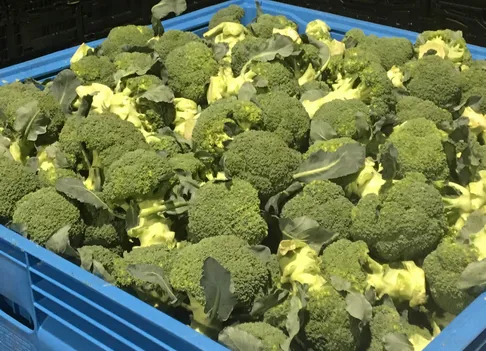Australian growers and producers are being encouraged to register any new Intellectual Property (IP) and trademarks as quickly as possible, before entering international markets.
David Bennett, Councillor (Intellectual Property) at the Australian Embassy in Beijing, provides advice for growers entering the Chinese market, to ensure that their rights are being protected. With the most common types of protections being trademarks and plant breeders’ rights (PBR), he warns that they are private, meaning that it is up to individual businesses to enforce any breaches.
"The first step that I would emphasise is registering IP Rights, that's the minimum you should do, so you have enforceable rights you can use in the case of an infringement," Mr Bennett said. "The next level up is monitoring and enforcing; your IP is only really as good as your enforcement - if you don't enforce it, the right doesn't have any meaning. The IP owners are responsible for their own enforcement, this isn't something the government does on behalf of owners - it's an individual responsibility."

Photo: David Bennett at the Citrus Market Outlook Forum
He highlighted one company who he believes has done an excellent job in protecting their fruit variety; Zespri, and the Gold3 variety, which is known for its resistance to Psa, as well as a number of key distinctive taste and appearance characteristics. Mr Bennett says they first registered PBR and licenced it to growers in New Zealand and Italy, then developed a brand SunGold. This was then protected it by registering trademarks and the company actively enforces these rights internationally to ensure the kiwifruit is considered a premium product in the markets.
An IP owner or their legal team must first file an application with IP Australia and realise that the rights are territorial, meaning applications must be made in individual countries where protection is sought. With IP rights not automatically protected, Mr Bennett says there are two ways in which IP owners can monitor their produce through the supply chain to maintain product integrity; through online searches and physically in the markets. There is no single international IP right, but there is an international system to make it easier to file applications in different countries.
"If you do find an infringement, local legal advisors can help with what the next steps are and legal action," he said. "(Another point is that) other countries’ legal systems are different from ours. An Australian style contract does not necessarily work well in say China; an Australian lawyer cannot draft a contract to be performed in China, any better than a Chinese lawyer can draft one for Australia. If you are going into overseas markets, make sure you have local lawyers specialised in contracts, to make sure it will be enforceable in the country where you are using it. With all business deals, you will be wanting to do due diligence on potential partners and contracts before you sign. Bilingual contracts can also help to ensure everyone is on the same page."
The most common way for IP owners to protect their brand is through a trademark, which is a sign that can distinguish goods or services from others and is usually a logo or word.
"In order to be registered, a trademark has to be distinctive and a new trademark," Mr Bennett said. "You can register an invented name, provided nobody else has registered an identical or similar trademark. What a brand does, in citrus, for example, is distinguish a product from just being a commodity to having the potential to be a premium product. Many countries, like China, operate on a 'first to file' trademark system. It is different to Australia and means that the first person to apply for a trademark gets it. It doesn't matter who first developed it or has been using it. That's why it is important to apply for a trademark early."
He added that there are often unscrupulous people out there, referred to as squatters or hijackers, who make a practise of registering other people's trademarks. A popular occurrence is that companies that visit for trade fairs and exhibitions are not only promoting their products to genuine buyers but displaying their trademarks to be ripped-off.
"When they (a product owner) tries to come into the market, they try to make a profit selling it back to them," Mr Bennett said. "They can also try and use the brand to sell their own products and exploit their reputation. It is singly the most frequent IP issue that I see in China, affecting Australian businesses - even more than counterfeits. It affects companies that are big and successful, but also micro-companies. It's quite hard to fix these problems afterwards, it is much easier to prevent them by registering early. One company, in particular, that was affected, is more likely to leave the market than try and fight it."

With more than 25 million trademarks registered in China, potentially legitimate trademarks could already have been registered to someone else, or a competitor. So, Mr Bennett points out that it cannot be assumed that trademarks used in one country can be used in another. He also warns against letting third parties, such as importers or distributors register trademarks because if they register it in their own name, they will then own it.
Another IP protection is Plant breeders' rights, provide exclusive rights over a new plant variety that is distinctive, uniform and stable. Mr Bennett says applications can be filed within 12 months of first sale or advertisement in Australia, otherwise, they are in the public domain. Varieties coming in from overseas, have between 4-6 years, from first sale overseas.
"Just like trademarks and other IP rights, PBRs are territorial," he said. "A PBR registered in Australia only provides protection in Australia. So, to be protected in other countries, you need to apply in any market you want to be protected in. The first port of call should be consulting a private PBR qualified person, or consultant, who are experts in particular plants and varieties. We have accredited them to certify applications, and a nominated qualified person will oversee the growing trial where you grow your variety against the nearest comparator and establish it is distinct."
For more information visit: www.ipaustralia.gov.au/
